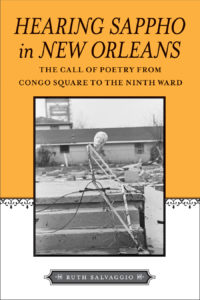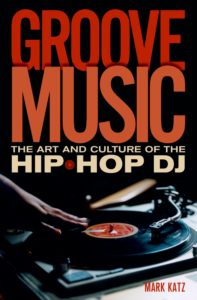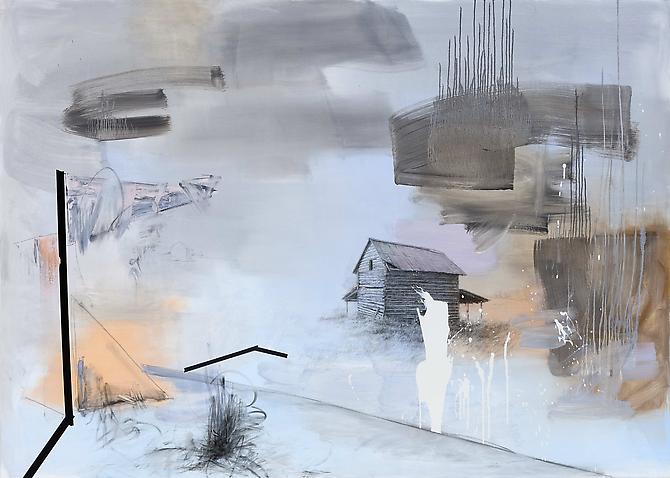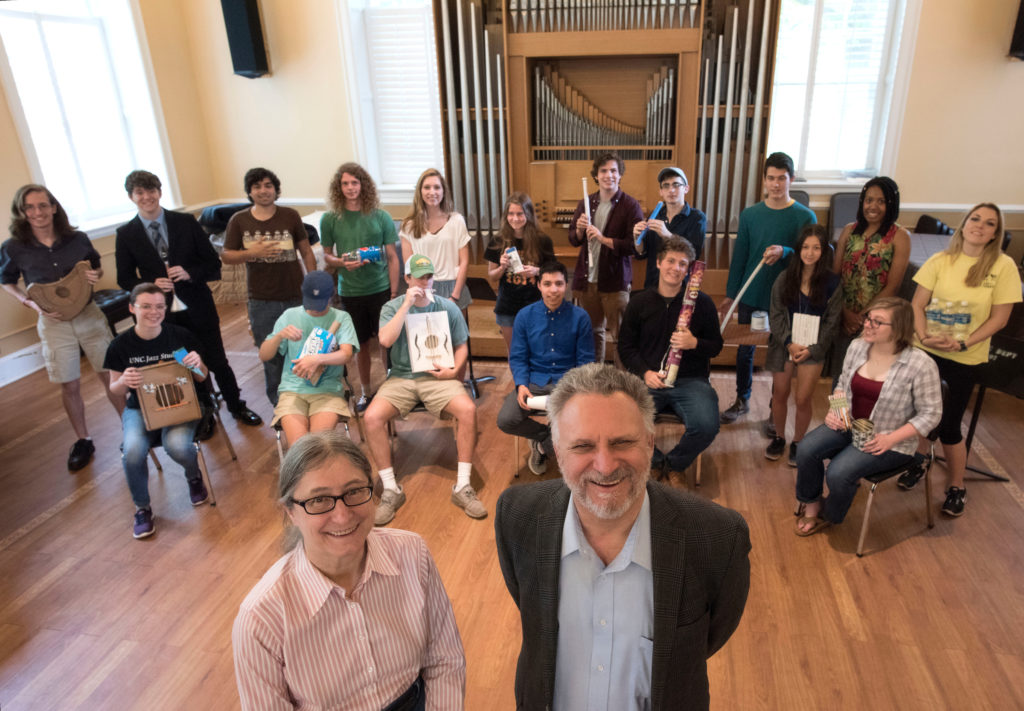
On April 21, UNC lost one of its literary luminaries with the passing of creative writing professor Doris Betts, UNC Alumni Distinguished Professor Emerita. Carolina will host a gathering in her honor and memory Oct. 7 at 3 p.m. at the George Watts Hill Alumni Center.
“Doris Betts was an extremely serious and unsentimental artist, a candid and powerful teacher, a devoted and constant friend, and a profound warmth and joy underlay it all. Her advice and counsel were the best there was, and if one person could really help another get through sad, tough, trying times, she was that one. Legendary were her genius for friendship, her compassion, her capacity for work, and her tenacity in crafting the clearest and most compelling prose. She was as a literary artist the same way she was as a woman: direct, penetrating, surprising and wise.” Bland Simpson, Kenan Distinguished Professor of Creative Writing
****
Books (fall 2012)
 Did Jesus Exist? The Historical Argument for Jesus of Nazareth (Harper Collins) by Bart Ehrman. Just when you thought you had UNC’s agnostic religious studies scholar figured out (he enjoys debunking sacred texts), Bart Ehrman has a surprise in store. His newest book provides persuasive historic evidence that Jesus, the man, was for real. And it’s a page-turner. Ehrman is the James A. Gray Distinguished Professor of Religious Studies.
Did Jesus Exist? The Historical Argument for Jesus of Nazareth (Harper Collins) by Bart Ehrman. Just when you thought you had UNC’s agnostic religious studies scholar figured out (he enjoys debunking sacred texts), Bart Ehrman has a surprise in store. His newest book provides persuasive historic evidence that Jesus, the man, was for real. And it’s a page-turner. Ehrman is the James A. Gray Distinguished Professor of Religious Studies.
Two Captains from Carolina: Moses Grandy, John Newland Maffitt, and the Coming of the Civil War (UNC Press) by Bland Simpson. A born storyteller fascinated by coastal history, Simpson weaves together the lives of two 19th century mariners who never met — an African-American and an Irish-American. It’s a real-life saga of race, hardship and conflict in the Civil War-era South. Simpson is the Kenan Distinguished Professor of Creative Writing and longtime member of the Tony Award-winning Red Clay Ramblers.
Woody Durham: A Tar Heel Voice (John F. Blair) by Woody Durham’63 with Adam Lucas ’03. Our State magazine once said this about the long-time radio play-by-play man known as the “Voice of the Tar Heels:” “To his listeners, he’s what powder blue sounds like.” In this autobiography, Durham takes readers behind the scenes with the coaches and players he worked with during his 30-year tenure.
The Southern Journey of Alan Lomax: Words, Photographs and Music (W. W. Norton & Company) by Tom Piazza with an introduction by William Ferris. More than 50 years ago, Lomax traveled the South, uncovering little-known backcountry and blues music, with his camera as his constant companion. This new volume features a collection of 65 largely unpublished photographs. Ferris discusses the life and career of the man known for introducing musicians like Woody Guthrie, Pete Seeger, Muddy Waters and Burl Ives to a mass audience. Ferris is the Joel R. Williamson Eminent Professor of History and senior associate director of the Center for the Study of the American South.
 Hearing Sappho in New Orleans: The Call of Poetry from Congo Square to the Ninth Ward (LSU Press) by Ruth Salvaggio. While sifting through trash in her flooded New Orleans home, Salvaggio discovered an old volume of Sappho’s poetry that was stained with muck and mold. In her efforts to restore the book, Salvaggio realized that the process reflected how the Greek poet’s own words were unearthed from the refuse of the ancient world. The UNC professor of English and comparative literature sets out to recover the city’s rich poetic heritage while searching through its flooded debris.
Hearing Sappho in New Orleans: The Call of Poetry from Congo Square to the Ninth Ward (LSU Press) by Ruth Salvaggio. While sifting through trash in her flooded New Orleans home, Salvaggio discovered an old volume of Sappho’s poetry that was stained with muck and mold. In her efforts to restore the book, Salvaggio realized that the process reflected how the Greek poet’s own words were unearthed from the refuse of the ancient world. The UNC professor of English and comparative literature sets out to recover the city’s rich poetic heritage while searching through its flooded debris.
Enduring Injustice (Cambridge University Press) by Jeff Spinner-Halev. Governments today often apologize for past injustices, and scholars increasingly debate the issue, with many calling for apologies and reparations. Spinner-Halev, UNC Kenan Eminent Professor of Political Ethics, argues that there are “enduring injustices” — those that begin in the past, continue today and will continue into the future unless specifically addressed. A reviewer said “This is an insightful and provocative book by one of the country’s most consistently interesting political theorists.”
Johnny Johnson, Series I, Volume 13 (Kurt Weill Foundation for Music) edited by Tim Carter. Originally produced by the legendary Group Theatre in 1936, Johnny Johnson (with book and lyrics by UNC playwright Paul Green) marked Weill’s first contribution to American musical theater. UNC musicologist Carter draws on a variety of surviving source material for this volume, including not only Weill’s manuscripts but also rehearsal scores and sets of instrumental parts, to bring this edition to full score. Carter is David G. Frey Distinguished Professor of Music.
Neighbors and Other Strangers (Mint Hill Books) by Ruth Moose. Women in small-town life are the characters that populate this new collection of short stories — like Loretta, who makes a lemon pie with tofu for the second wedding of her first boyfriend. One reviewer wrote: “Ruth Moose is gifted with an unfailing ear for conversation, a sharp eye for details, a sympathetic heart and a wit Mark Twain would approve.” Moose has retired from UNC’s creative writing faculty.
 Groove Music: The Art and Culture of the Hip Hop DJ (Oxford University Press) by Mark Katz. It’s all about “the scratch” in this new book about the figure that defined hip-hop: the DJ. Katz (chair of UNC’s music department and an amateur DJ) delves into the fascinating world of the DJ, tracing the art of the turntable from its humble beginnings in the Bronx in the 1970s to its place in global culture today. DJs discuss a wide range of topics, including the transformation of the turntable from a playback device to an instrument in its own right.
Groove Music: The Art and Culture of the Hip Hop DJ (Oxford University Press) by Mark Katz. It’s all about “the scratch” in this new book about the figure that defined hip-hop: the DJ. Katz (chair of UNC’s music department and an amateur DJ) delves into the fascinating world of the DJ, tracing the art of the turntable from its humble beginnings in the Bronx in the 1970s to its place in global culture today. DJs discuss a wide range of topics, including the transformation of the turntable from a playback device to an instrument in its own right.
The Tree of Forgetfulness (LSU Press) by Pam Durban. In her new novel, UNC’s Doris Betts Distinguished Professor of Creative Writing recovers the largely untold story of a brutal Jim Crow-era triple lynching in rural South Carolina. By interweaving several characters’ voices, Durban produces a complex narrative that resurrects a troubled past and the individuals who chose silence over justice.
The Evening Hour (Bloomsbury USA) by Carter Sickels. The coal-mining world of Dove, Creek, W.Va,. vividly comes to life in this debut novel by UNC alum Sickels (M.A. folklore ’10). Born and raised there, 27-year-old Cole Freeman has sidestepped work as a miner to become an aide in a nursing home. He’s also a drug dealer, reselling prescription drugs his older patients give him. Freeman has always dreamed of leaving, but when disaster befalls his hometown, he is forced to confront his fears and take decisive action.
27 Views of Asheville and 27 Views of Durham (Eno Publishers). Authors with UNC ties contribute to the third and fourth in this series of anthologies of contemporary Southern towns. In Asheville, writers address everything from UNC alumnus Thomas Wolfe’s powerful legacy to the town’s celebrated Art Deco architecture. UNC creative writing professor Michael McFee’s poem, “McCormick Field” tells of the time Babe Ruth fainted right after his arrival in Asheville. Durham writers capture the essence of the city known for its tobacco, diversity, sports and grit. UNC folklore M.A. grad and News & Observer columnist Jim Wise opens the Durham anthology with the piece “A Sense of Place.”
 Buenas Noches, American Culture (Indiana University Press) by María DeGuzmán. Often treated like the night itself — both visible and invisible — Latina/os make up the largest minority group in the U.S. In her newest work, DeGuzmán explores representations of night in art and literature from the Caribbean, Central and South America, and the U.S., calling into question night’s effect on the formation of identity for Latina/os. She is professor of English and comparative literature and director of Latina/o studies at UNC.
Buenas Noches, American Culture (Indiana University Press) by María DeGuzmán. Often treated like the night itself — both visible and invisible — Latina/os make up the largest minority group in the U.S. In her newest work, DeGuzmán explores representations of night in art and literature from the Caribbean, Central and South America, and the U.S., calling into question night’s effect on the formation of identity for Latina/os. She is professor of English and comparative literature and director of Latina/o studies at UNC.
Cherokee Stories of the Turtle Island Liars’ Club (UNC Press) by Christopher B. Teuton, with Hastings Shade, Sammy Still, Sequoyah Guess and Woody Hansen. This collection features 40 interwoven stories, conversations and teachings about Western Cherokee life, beliefs and the art of storytelling, known in the Cherokee language as gagoga, literally translated as “he or she is lying.” The book reveals how the members of the Liars’ Club understand the power and purposes of oral traditional stories. Teuton, a member of the Cherokee Nation, is UNC associate professor of American studies.
Colonial Entanglement (UNC Press) by Jean Dennison. From 2004 to 2006, the Osage Nation conducted a contentious governmental reform process in which sharply differing visions arose over the new government’s goals, the Nation’s own history and what it means to be Osage. UNC anthropologist Dennison, a member of the Osage Nation, brings to light the many complexities of defining indigenous citizenship and governance in the 21st century.
 The Renegades (Putnam) by Tom Young. A catastrophic earthquake ravages Afghanistan, and American trops rush to deliver aid, among them Afghan Air Force adviser Lieutenant Colonel Michael Parson and his interpreter, Sergeant Major Sophia Gold. The devastation facing them is like nothing they’ve ever seen, however — and it’s about to get worse. This is the third in a series by Young (RTVMP B.A. ’83, M.A. ’87) who has logged nearly 4,000 hours for the Air National Guard in Iraq, Afghanistan, Bosnia, Kosovo and elsewhere.
The Renegades (Putnam) by Tom Young. A catastrophic earthquake ravages Afghanistan, and American trops rush to deliver aid, among them Afghan Air Force adviser Lieutenant Colonel Michael Parson and his interpreter, Sergeant Major Sophia Gold. The devastation facing them is like nothing they’ve ever seen, however — and it’s about to get worse. This is the third in a series by Young (RTVMP B.A. ’83, M.A. ’87) who has logged nearly 4,000 hours for the Air National Guard in Iraq, Afghanistan, Bosnia, Kosovo and elsewhere.
[College Bookshelf appears in the fall 2012 issue of Carolina Arts & Sciences magazine. ]



